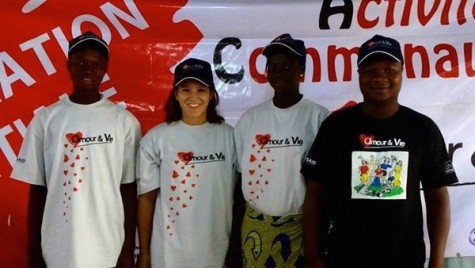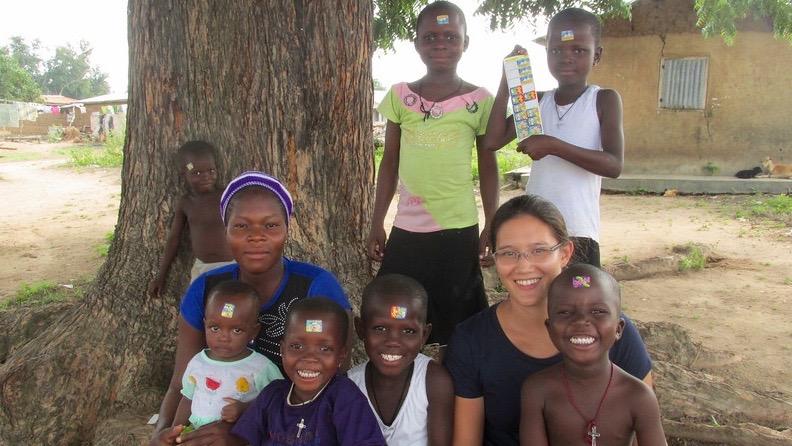WHS alumna Lindsay Gardel discusses her work in the Peace Corps
Credit: Courtesy of Lindsay Gardel
Above is Lindsay Gardel (bottom right) with a few children she used to work with. Gardel, an alumna of WHS, discusses her work in the Peace Corps in Benin, Africa. “You learn a lot about different cultures and the way that people live when they have a different socio-economic status,” Gardel said.
Lindsay Gardel, class of 2006, returned to WHS to give a presentation about her work in the Peace Corps in Benin, a West African country. Gardel was asked by her former French teacher, Sara Langelier, to give a presentation regarding her work in one of Langelier’s French classes.
According to Gardel, she wasn’t expecting to pursue public health going into college.
“Public health isn’t really [something] you learn about in high school, and I didn’t learn about it until I did research on a public health study at Mass General,” Gardel said. “Look through the course catalog [when you go to college] and read the class descriptions and see what you’re interested in because I probably wouldn’t have looked into public health. Going into college, I wasn’t really thinking about public health until I had this job.”
After earning a bachelor’s degree in Community Health from Tufts University, she wanted to live overseas because she didn’t get to study abroad in college. She decided to join the Peace Corps because she had a lot of friends who had enjoyed their experience as volunteers. Gardel explains how the Peace Corps is a unique way to get health experience abroad.
“You go and live somewhere for two years, and you really understand what your community needs and how you can help them. You can do a visit, like a medical trip to Honduras for two weeks or something, but it’s not the same because you don’t understand what their problems are or how they need to be fixed,” Gardel said.
According to Gardel, she had originally wanted to work in South America, but because of the long waiting list to work there and her skills in French, she was assigned to Benin, a French-speaking country. She explains that when going into the Peace Corps, you can choose your preferred country and sector, provided that you meet the prerequisites such as the required language skills.
The Peace Corps is a federal program. According to the Peace Corps website, its mission is “to promote world peace and friendship by fulfilling three goals: to help the people of interested countries in meeting their need for trained men and women, to help promote a better understanding of Americans on the part of the peoples served [and] to help promote a better understanding of other peoples on the part of Americans.”
“It’s really like a diplomacy mission with some aid components, rather than an aid organization. There’s a lot of culture exchange going on,” Gardel said.
Gardel says she enjoyed the cultural exchange involved with being in the Peace Corps. She liked living in a small community and knowing everyone in the village. She had a regular routine there, which included playing with the kids in the area. According to Gardel, the village in Benin was much more social than the city where she lives now. She also liked the experience of riding a motorcycle and eating the fruit in Benin, such as pineapples and mangos.
Gardel’s day-to-day life in Benin recently changed after moving from a village to a city. If she’s not doing anything in the field, she will often work 10-12 hour shifts.
On a typical day, she wakes up at around 7 a.m and makes breakfast. She has a kitchen with a gas stove similar to a camping stove, electricity and running water. After work, she comes home and goes to the market to buy food for dinner. It takes Gardel and her roommate, who works in the same non-governmental organization (NGO), three hours to cook, eat and clean.
There are many NGOs people in the Peace Corps work for. Gardel focuses on various health projects; her group recently submitted a $4.5 million grant for a women’s health project to pilot a public sector program for long-acting reversible contraceptives so that women can have access to family planning services, including intrauterine devices (IUDs) and implants, which are not generally available in Benin.

Pictured is Gardel with her peer health education team in Benin.
According to Gardel, Benin has a high maternal mortality rate, partly due to difficulties in health care delivery. She and her NGO are working with the government to improve Benin’s medical protocol, service delivery and medical school curriculum.
“I worked in a health center for my first two years, so you get to do a lot more direct care and service provision, but now that I’m at this NGO, we do a lot more policy-based work, like working with the government,” Gardel said. “We added Misoprostol, [which] is an abortion drug, to the list of essential medicines, so we had to get it registered so that it could be provided in Benin because it improves maternal outcomes.”
Gardel explains that she and her NGO are targeting small areas of Benin to test projects. They then increase the area if the project is a success to see how the national policies will work in the field.
Having lived, grown up and went to school in Wayland, Gardel shares how living in another part of the world, especially a very different one, is an eye-opening experience.
“You learn a lot about different cultures and the way that people live when they have a different socio-economic status,” Gardel said. “Benin is one of the poorest countries in one of the poorest regions of the world, so when you live in a community where nobody really makes more than a couple dollars a day, you see how their lifestyle is different than what I grew up with. That motivated me to go into more international health work.”
Your donation will support the student journalists of Wayland High School. Your contribution will allow us to purchase equipment, cover our annual website hosting costs and sponsor admission and traveling costs for the annual JEA journalism convention.

























